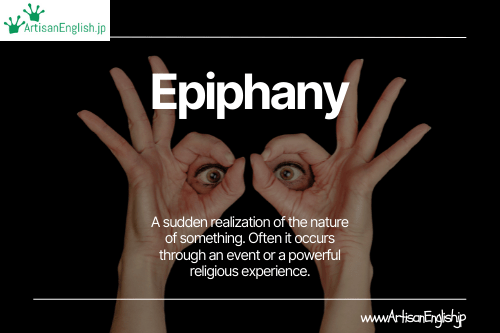
YouTube / iTunes / Spotify / Radio Public / Pocket Casts / Google Podcasts / Breaker / Overcast
Listen to ArtisanEnglish.jp posts & lesson intros here.
Word of the Day: Epiphany
Have you had your epiphany yet?
The leaders of the Western world have.
Germany especially, has learned that you may get burned if you play with fire.
Mix that with natural gas, and you might have a fireball of destruction on your hands.
An epiphany is a sudden realization of the nature of something. Often it occurs through an event.
In this case, the world has finally realized the nature of the beast named Vladimir Putin.
I should also mention that an epiphany can also be a powerful religious experience.
However, since I’m concentrating on Vladimir Putin and how we are now witnessing the birth of a new world order in this post, I don’t think the religious meaning is relevant here.
In November 1989, the Cold War ended, and the post-Cold War era began.
Yes, I know the names of the periods are not the most inventive, but we’re dealing with historians here.
Anyways, the West, predominantly European nations, thought they could control Putin by purchasing their energy from Russia and thereby ensuring Russia’s dependence on their economic power.
You don’t bite the hand that feeds you, right?
They failed to foresee that Putin had an ulterior motive.
He saw his dependency on them as a sign of strength and their addiction to Russia’s energy as their weakness.
Now the fat is in the fire, war rages in Europe, and Europe’s epiphany came too late.
Japan, too, has been forced to reorganize and look at the world differently.
Today, the yen sank to 126 to the US dollar.
Japan’s vulnerability to outside forces beyond its control has been an epiphany to a generation that has only known deflation.
Flesch-Kincaid Readability Test
This post is understandable by someone with at least an 8th-grade education (age 13 – 14).
On the Flesch-Kincaid reading-ease test, this post scores 63.
The easier a passage is to read, the higher the score on a scale of 0 – 100.

